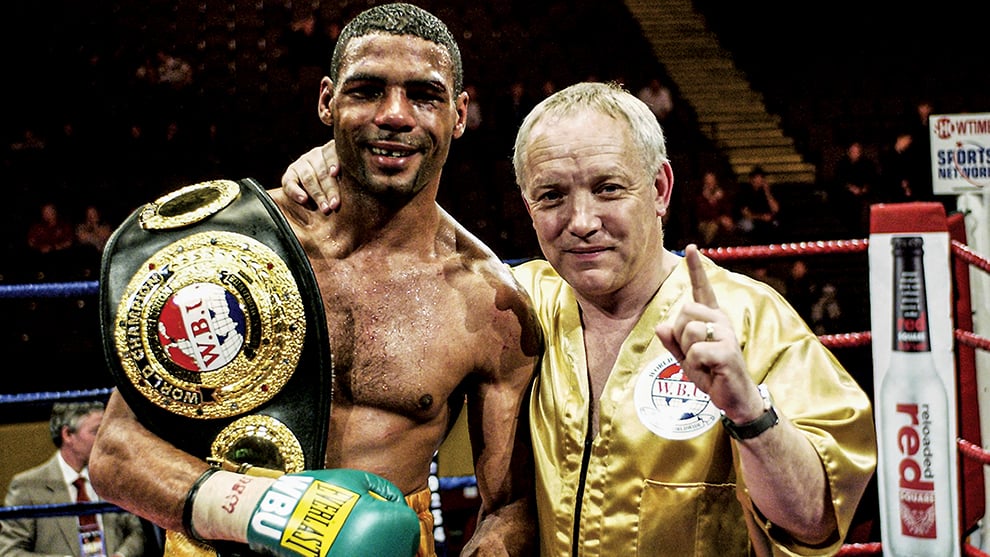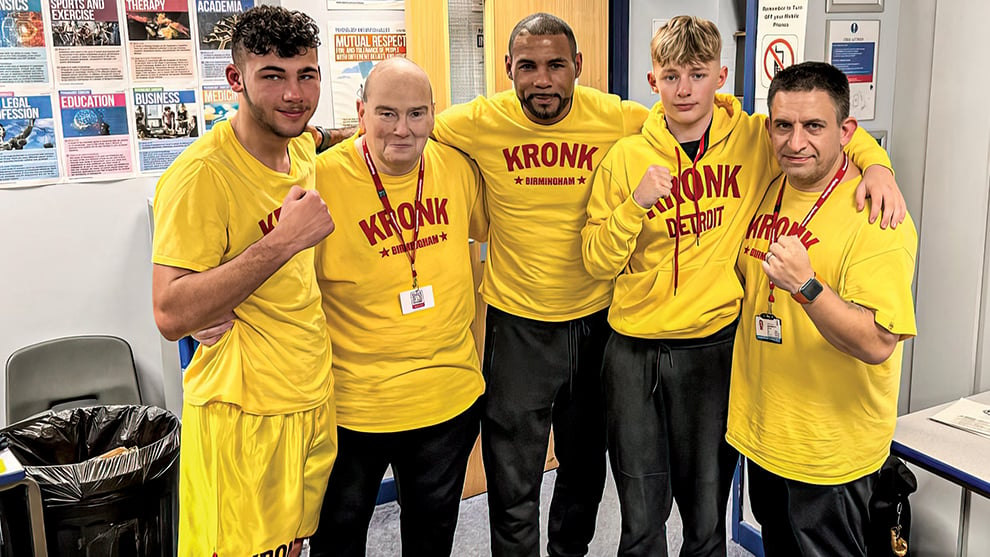By Oliver Fennell
Wayne Elcock never realised how much his father admired him as a boxer until it was too late.
Different people have different ideas about how to motivate others, and Elcock’s father apparently thought it best to refrain from giving praise.
“Whenever I made it to the final of a tournament, the first thing my dad said to me was, ‘Son, no one will remember you coming in second,'” Elcock recalled of his amateur days.
“Even if I knock someone out, the first thing he’ll talk about is the shot that hit me.
“Maybe it was my dad’s way of doing things – he didn’t want me to get cocky, but I just didn’t love boxing anymore and I stopped for four or five years.
“I was working as a road paving worker. The pay was good but it was gruelling 10-hour shifts every day. I couldn’t bring myself to go to the gym afterwards so I’d go to the pub. I’d watch fights on Saturday nights, watch boxers I’d beat as amateurs on TV and then fight in the pub afterwards. I couldn’t stand the drink and, looking back, it must have been frustrating.
“Boxing was out of the question. I was overweight and not doing anything with my life. I was drinking, having sex. I was hanging out with young people who had no ambition and didn’t want others to be ambitious. If I said I was boxing again, people would laugh.”
![]()
But one person never laughed at Elcock’s boxing. His father may not have been the most effusive in his praise, at least not to Elcock himself, but that may have been a sign of how seriously he took the sport. “My dad begged me to give it another go,” Elcock says of those missing years.
He eventually achieved it, but too late for his father, who was killed in a car accident in 1998. Naturally it was a devastating experience for Elcock, but his father’s death led him to posthumously discover how his father really felt about him and to reinvent himself as a boxer.
“All kinds of people attended my father’s funeral. People came up to me and asked me about boxing. They all said my father was telling everyone who would listen how good I was, how far I could go, that I was going to be world champion,” he said.
“After the funeral, I sat there and thought to myself, ‘I have to finish this for my dad.’
The ensuing decade of his professional career, which began in 1999, may not have delivered the world championship his father predicted, but it was still a proud, exciting and glorious season that included British, English and WBU crowns, and a chance at a world title, though he unsuccessfully challenged IBF middleweight champion Arthur Abraham. But by that time, “The Mad Dog” had already one foot in the door of the sport, and he considered his last fight – an upset win over Howard Eastman, one of the best British middleweights of the 21st century – a low point and a vindication of his father’s faith.
“Every time I played professionally I had a picture of my dad in my sock,” he said, “and after I beat Eastman I took it out, looked up and said, ‘Dad, I did it.'”
That unanimous decision in September 2007 stands as the standout result on Elcock’s record, but other wins include Darren Rose (twice), Anthony Farnell, Lawrence Murphy (avenging a first-round knockout loss), Steve Bendall and Darren McDermott. The win over Eastman set up a world title fight against Abraham, but Elcock says it wasn’t motivated by fighting spirit at the time, but more a memory of his late parent.
“I was just thinking about the money,” he says. “I probably should have quit after Eastman, but Abrahams was a good salary. I was only eight or nine weeks out of Eastman, and I was waking up every morning thinking, ‘Damn it!’ But I told myself, ‘Just think about the money, I’m just gonna give it a go and see what happens.'”
Although Elcock was knocked down in the second round, he otherwise showed quicker punches and better offensive power than Abraham, and the German prevailed, sealing the victory in the fifth round in Basel, Switzerland.
“I wasn’t confident, but after Abraham got cut in the fourth round, I started throwing more jabs, then two, then three. My mindset changed. I started to believe I could win, but then I got stopped!”
“He had by far the strongest puncher I’ve ever faced. When he knocked me down in the second round, his punches were so hard I didn’t even feel the pain, you know? I didn’t even know I’d been knocked down. I just saw the referee counting and I was like, ‘What am I doing?'”
Elcock has fought twice since then, the last time being in the “Battle of Birmingham” derby against Matthew Mackin in March 2019. Mackin won in three rounds but Elcock claims he was injured before the bout. “I had broken my leg in two places,” he says. “My tibia and fibula. The first one I broke playing football and the second one I broke while training.”
Injured and defeated, and at 35, retirement was the obvious choice for Elcock, but like many others, there was the temptation to fight at least one more time.
“I was booked to fight Darren Barker but a few weeks later I became unwell, my weight dropped to 11 stone and I had to withdraw.
“Then, after a few years out of the ring, I got an invitation to fight James DeGale. I thought, ‘OK, I’ll put that money into my business’ and asked how much it was and they said $7,000. $7,000 to fight an Olympic gold medallist!”
“Luckily, I didn’t need it, but for a lot of ex-fighters, $7,000 is a lot of money. [Some] When promoters see people with big names, instead of helping them, they rip them off.”

MANCHESTER – APRIL 5: Wayne Elcock of Great Britain and his manager Frank Maloney celebrate after the WBU middleweight championship bout between Wayne Elcock of Great Britain and Anthony Farnell at the MEN Arena in Manchester, England on April 5, 2003. The bout was won by Wayne Elcock of Great Britain. (Photo by John Gichigi/Getty Images)
Elcock then focused on a new career, starting out as a trainer and then running a boxing shop, where Boxing NewsMad Dog Boxing Store on the outskirts of Birmingham is defying the decline of brick-and-mortar retail by running its own stores in person and offering a more customized experience than buying online or from a chain.
The interview is interrupted several times as customers drop in – amateur boxers preparing for the new season – and Elcock deals with each of them individually, discussing their wants, experience level, weight etc, and making individual recommendations rather than simply recommending the most expensive option.
“If a beginner comes in and wants a pair of raising gloves for £200-£300, I won’t sell them,” he says. “I won’t sell you what you want. need“Most of the shops are run by businessmen or fans. I don’t know of any other place where former pros can give advice like this. I’ve had kids ride on the pads here.”
Coaching-wise, Elcock started with a program called Box Clever, an ingenious “mobile gym” made up of rings that could be loaded into the back of a van with other equipment and then dropped off and set up wherever there was a bit of floor space – usually a school.
Elcock explains why he wanted to teach kids boxing: “There was a lot of crime where I grew up. [Chelmsley Wood]They went in one direction or another. Most of them went in one direction or another. [towards crime]; I was one of those rare guys who did the opposite. My buddies would say, “Hey, there’s a stolen car over there.” I’d say, “I’m going to the gym.” They’d say, “You idiot!” But I knew the respect I’d get as a boxer would far outweigh the respect I’d get as a criminal.
“I wrote a programme for children, combining boxing with education. In maths, for example, you get points in matches. I set tasks with bronze, silver and gold prizes given and the courses are divided into rounds. The kids didn’t even know they were getting an education! Box Clever has grown rapidly – we’ve visited 39 schools across the Midlands.
“The council came to me and said, ‘This kid is a nightmare, he’s been excluded from school, he’s always in trouble with the police. If we can do something about him it will be a miracle. He was 11 years old and turned up with his mum, he saw me and said ‘I don’t care who you are, your mum dragged you here’. He just sat there. No matter what I did he said ‘No’. I managed to get him to put the gloves on. He hit the pads and I said ‘Wow, you’ve got the strength. It would be a shame if you got into trouble again. You’ve got the talent.'”
“The following week he came back and after a few weeks his mum said, ‘What have you done with my son? He’s eating porridge in the morning, he’s going for runs and I’m sending him to school’. He was 11 then. Now he’s 26 and a professional.”
That pro, Birmingham welterweight boxer Elliot Hurley, boxes at Kronk Birmingham, Elcock’s competitive gym, which is officially endorsed by the legendary Detroit brand. Box Clever caters to kids, the general public and beginners, while competitive-minded people train at Kronk, including Elcock’s son, Wayne Jr.
“I didn’t want my son to take up boxing but the kids at school knew his dad was a boxer so he came to me and said he wanted to try it.” Junior is now a 16-year-old amateur light middleweight with 12 bouts under his belt, including a Midland championship.

Ultimately, Elcock, now 50, is doing well and he attributes that to advice he received from his coach, Paddy Lynch, when he was still fighting.
“Paddy helped me think about what I was going to do when I retired,” he says. “I’d say, ‘Retire, you bastard? I’m only just getting started!’ But he’d say, ‘Get some more money in the bank and keep some ideas in the back of your mind. It may seem like a long time but it will be over in a flash.'”
“People think I’ve made a lot of money from boxing. They say to me, ‘What are you working for? You’d rather be having a cocktail on the beach’. I had money in the bank but I’m a hard worker and I wanted to give back to others what Paddy had done for me.”
“I earn more now than I did when I was boxing. I pay for the gym and the pros train for free. I’ll only take the minimum pay if they win the British title.”
“My satisfaction doesn’t come from money, it comes from changing people’s lives.”
#Wayne #Elcock #helping #change #lives #generation #Boxing #News